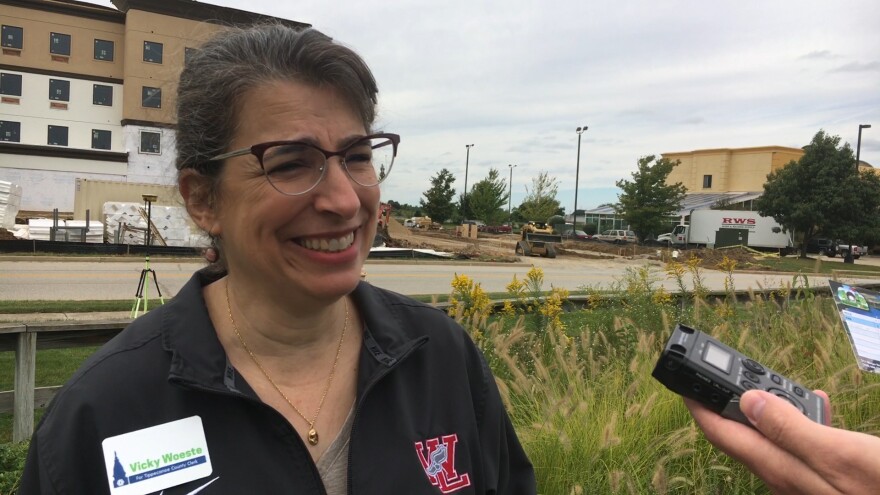As WBAA set up its mini-golf conversations about this year’s local elections, every single candidate responded in some way. Unfortunately, not every one chose to participate. The sheriff’s candidates got together after their one formal debate and decided they’d forego golfing. Both clerk candidates initially questioned the format, but only one of them could be persuaded to putter around the course.
A 'More Professional' Format
The first e-mails back from both clerk candidates -- Democrat Vicky Woeste and Republican Julie Roush -- questioned the conversation’s unorthodox format, which was understandable – it’s not been done before and we weren’t suggesting a formal debate.
Woeste eventually agreed to participate, but Roush declined, saying she’d prefer, in her words, “a more professional meeting.” That posed a couple questions:
Does WBAA decline to do a story on a race if just one candidate wants to wield a putter?
Or do we golf with some candidates and not with others?
In the end, we elected to stick with the format that we’d advertised and decided canceling the talk would give an unfair advantage to any candidate who declined to speak, since they’d effectively be silencing their opponent, too. So we spent a recent Saturday morning on the course with Woeste, who carded a four-over-par round which was good for a tie for best election mini-golf score of the season, along with the round shot by Senate candidate Sherry Shipley.

But it’s the answers to the questions that make the candidate, not their golf acumen.
Voting Machines
Woeste, who’s worked for the American Bar Foundation since 1994, says she thinks the office is being left in good shape by outgoing clerk Christa Coffey, but says Coffey’s replacement will quickly be faced with a big decision: replacing the county’s outdated voting machines.
“You know, we’re not going to test anything new, we’re not going to be a prototype," Woeste says. "We’re not going to spend money on something that isn’t proven. So I really don’t think this is sort of a pearl-clutching moment for the government. We’re ready to do this; everybody knows it needs to be done.”
Amd in an age where foreign agents have shown an interest in influencing U.S. elections, Woeste says she’s concerned only a couple Indiana counties currently require paper ballot backups.
“That will give us a paper trail, paper ballots, auditable vote trail and make it much more possible that their votes were counted as they were cast,” she says.
Early Voting Changes
Woeste also says the early voting process may need to be reformed.
“Why spend a whole early voting day staffing two or three nursing homes," she asks. "I’d just want to look and see what the return is. Where are we losing the most voters, where can we pick up the most voters?”
And she says the way to ensure as little politicization of the process as possible is to move vote centers around, rather than keeping them in the same places each election cycle.
“You know, we have the same polling places on election day, year in and year out. Maybe those should probably stay where they are. But early voting should be more mobile. Early voting should be as small-d democratic as possible. You know, we need to blanket the whole county as much as we can.”
Removing Politics From The Office
Such a move might help quell some recent concerns that the office has become needlessly political at times, such as when Coffey declined to issue same-sex marriage licenses for a couple days after a federal judge’s 2014 ruling legalizing those unions in Indiana.
When asked how she’d obey even those laws she didn’t agree with, Woeste said she’d have to tone down her personal streak of civil disobedience if she’s elected, noting that she’s spent significant time at protests in the last year or two.
“I mean, when the Supreme Court hands down a ruling, by definition that’s the law of the land," she says. "Doesn’t mean we always agree with it. And, frankly, there’s a lot of uncertainty about how the Court is going to handle its own precedent in the coming years. So it’s hard to say speculatively, hypothetically.”
One thing that’s not hypothetical: early voting in Tippecanoe County starts Wednesday, October 10th.
THE QUESTIONS
Below are videos of answers given to questions asked during the round of golf (one topic after each hole). Answers have been edited to reflect, as much as possible, only content responding directly to the question asked.
QUESTION 1: What's the most important issue in this year's race for clerk?
QUESTION 2: What sets your candidacy apart from your opponent's?
QUESTION 3: How do you keep politics out of the clerk's office?
QUESTION 4: What made you decide to run for clerk?
QUESTION 5: What about the office needs to be modernized or improved?
QUESTION 6: What changes need to be made to the clerk's budget? How would you spend any increases you're afforded?
QUESTION 7: How does the clerk's office stay ahead of the curve technologically?
QUESTION 8: How do you keep vote centers from being as politicized as they've been?
QUESTION 9: How can the voting process be improved to boost both turnout and security?


